- Books Name
- ABCD CLASSES Mathematics Book
- Publication
- ABCD CLASSES
- Course
- CBSE Class 9
- Subject
- Mathmatics
Representing Real Numbers on the Number Line
In Mathematics, a number line is a straight line, which represents the integers in equal intervals. The number line extends infinitely in both directions, and it contains both positive and negative integers. In this article, we are going to learn how to represent the real numbers on the number line with a complete explanation.
Real Number Line
The real number is defined as the union of a set of rational numbers and a set of irrational numbers. The real numbers include natural numbers, whole numbers, integers, rational and irrational numbers. We can represent all these types of numbers in the number line. The complex number is not represented using the number line as it is not included in the real number system.

The Real number line is just a number line. The point associated with the real number line is called the coordinate. The number “0” represents the origin. All the positive numbers are represented on the right side of the origin, whereas all the negative numbers are represented on the left side of the origin.
How to Represent the Real Numbers on the Number Line
Go through the following steps to represent the real numbers on the number line.
Step 1: Draw a horizontal line with arrows on both sides. Mark the origin “0” anywhere on the horizontal line.
Step 2: Mark the real numbers on the number line of equal lengths on both sides with a definite scale.
Step 3: Mark the positive numbers on the right side of the origin and negative numbers on the left side of the origin.
Step 4: If the given point is large, adjust the scale accordingly.
Step 5: If the given number is a rational or irrational number, convert them into a decimal format and mark the points using the process of successive magnification.
Note: The process of visualization of numbers on the number line using the magnifying glass is called the process of successive magnification.
Assume that, we want to locate the point 2.665 on the number line.
We know that point 2.665 lies on the number line between 2 and 3.
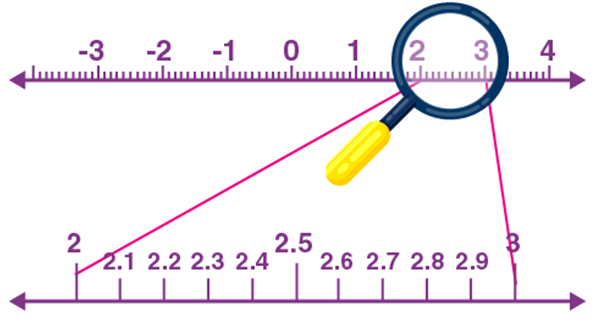
In between 2 and 3, there are 10 equal parts, say 2.1, 2,2, 2.3, and so on. In order to locate the 2.665 exactly, again focus on the points between 2.6 and 2.7, as 2.665 is located in between.
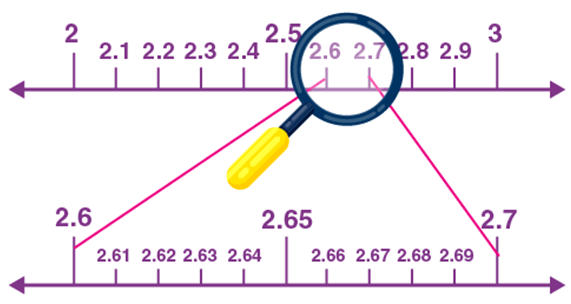
Since 2.665 is located between 2.66 and 2.67, again focus on these points.
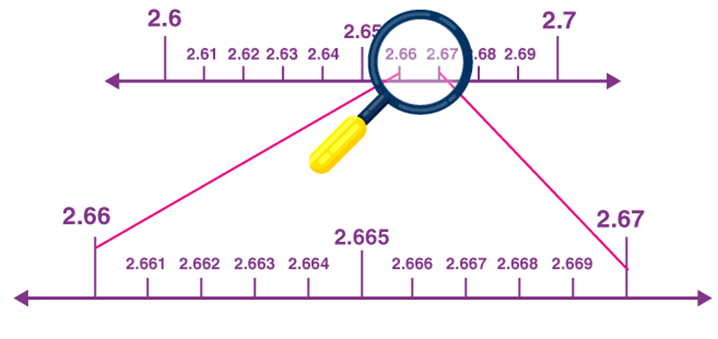
Thus, point 2.665 is located on the number line using the process of successive magnification. So, with the help of this method, one can locate the point by a sufficient successive magnification process to visualize the representation of real numbers (rational and irrational numbers) on the number line.
Also, read Rational and Irrational Numbers.
Practice Problems
Plot the following real numbers on the number line:
- 2.5
- 2.67
- 5.37
- 3.765
- 4.55
Representing Real Numbers on the Number Line
In Mathematics, a number line is a straight line, which represents the integers in equal intervals. The number line extends infinitely in both directions, and it contains both positive and negative integers. In this article, we are going to learn how to represent the real numbers on the number line with a complete explanation.
Real Number Line
The real number is defined as the union of a set of rational numbers and the set of irrational numbers. The real numbers include natural numbers, whole numbers, integer, rational and irrational numbers. We can represent all these types of numbers in the number line. The complex number is not represented using the number line as it is not included in the real number system.

The Real number line is just a number line. The point associated with the real number line is called the coordinate. The number “0” represents the origin. All the positive numbers are represented on the right side of the origin, whereas all the negative numbers are represented on the left side of the origin.
How to Represent the Real Numbers on the Number Line
Go through the following steps to represent the real numbers on the number line.
Step 1: Draw a horizontal line with arrows on both sides. Mark the origin “0” anywhere on the horizontal line.
Step 2: Mark the real numbers on the number line of equal lengths on both sides with a definite scale.
Step 3: Mark the positive numbers on the right side of the origin and negative numbers on the left side of the origin.
Step 4: If the given point is large, adjust the scale accordingly.
Step 5: If the given number is a rational or irrational number, convert them into a decimal format and mark the points using the process of successive magnification.
Note: The process of visualization of numbers on the number line using the magnifying glass is called the process of successive magnification.
Assume that, we want to locate the point 2.665 on the number line.
We know that point 2.665 lies on the number line between 2 and 3.
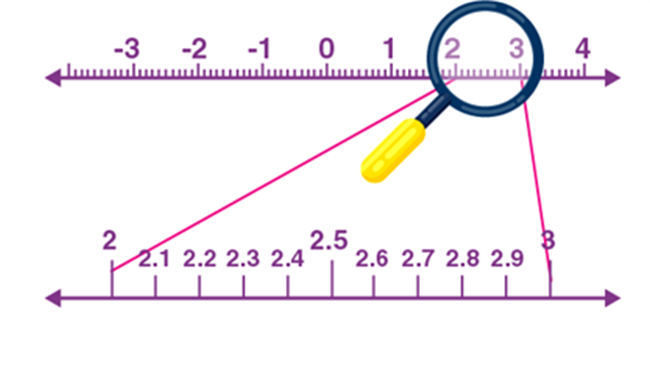
In between 2 and 3, there are 10 equal parts, say 2.1, 2,2, 2.3, and so on. In order to locate the 2.665 exactly, again focus on the points between 2.6 and 2.7, as 2.665 is located in between.
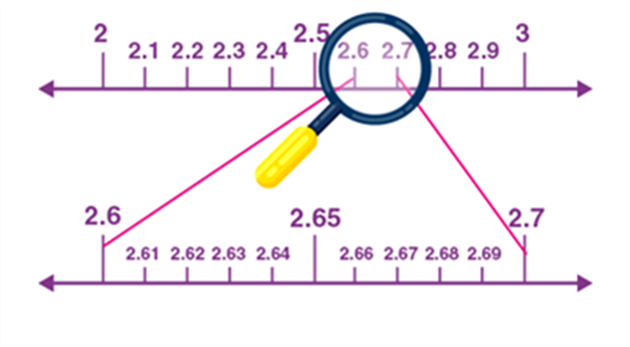
Since 2.665 is located between 2.66 and 2.67, again focus on these points.
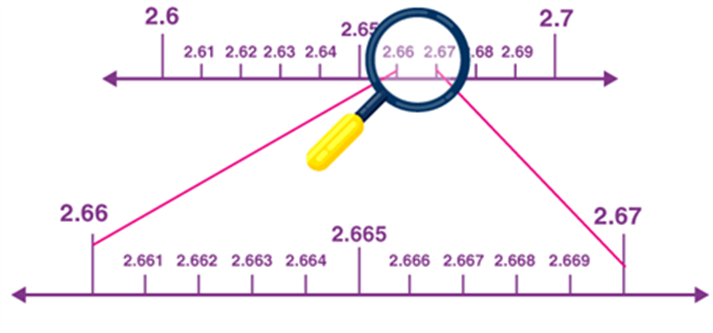
Thus, point 2.665 is located on the number line using the process of successive magnification. So, with the help of this method, one can locate the point by a sufficient successive magnification process to visualize the representation of real numbers (rational and irrational numbers) on the number line.
Also, read: Rational and Irrational Numbers.
Practice Problems
Plot the following real numbers on the number line:
- 2.5
- 2.67
- 5.37
- 3.765
- 4.55
To learn more Maths-related and class-wise concepts, visit – The Learning App and learn the concepts easily by exploring more videos.

 ABCD CLASSES
ABCD CLASSES
